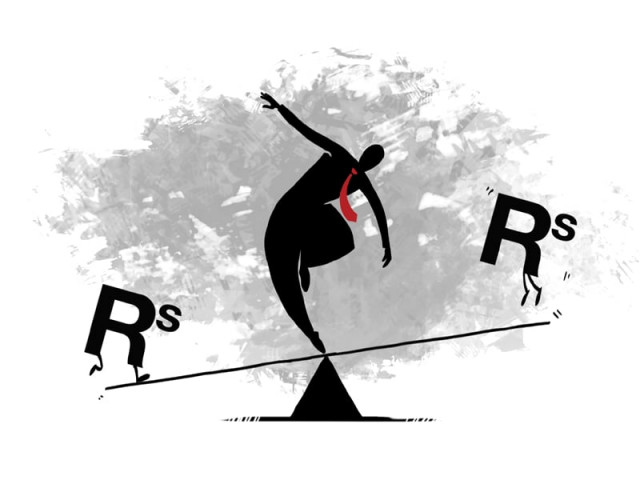Budget 2013: Populism to be balanced with pragmatism: Shaikh
Prime minister’s adviser says govt will offer subsidies in a ‘disciplined’ budget.

As the likelihood of general elections being held this year increases, the finance ministry sought to allay fears that the budget for fiscal year 2013 would be dictated by political populism.
At a press conference in Islamabad on Thursday, the prime minister’s adviser on finance, Abdul Hafeez Shaikh, promised to “balance” subsidies with fiscal discipline. “An impression is being given that the next budget will be announced under political compulsions. But we will try to maintain fiscal discipline as well as giving targeted subsidies,” said Shaikh, after being asked whether he would resign if pressured into presenting an economically unjustifiable budget.
The adviser, however, did not specify how the government would manage to simultaneously accomplish two goals that seem diametrically opposed to each other. According to the finance ministry’s three-year Budget Strategy Paper, the fiscal deficit for the financial year ending June 30, 2013 should not exceed 4.2% of the total size of the economy.
Yet, when pressed on specifics, it became clear that political pressures appear to heavily influence spending decisions even in non-election years. Planning Commission chief Nadeemul Haq, for instance, admitted that the government had released at least some development funds at the behest of politicians, including at times at the request of Prime Minister Yousaf Raza Gilani himself, but said that not all such requests were “honoured”.
Finance Secretary Wajid Rana put a specific number to those releases, stating that during the first seven months of fiscal year 2012, the government had spent Rs227 billion on development programmes (where most politicians hide their pork barrel projects), or about 75.6% of its annual development budget. Shaikh, however, insisted that this spending pattern was not unusual.
According to rules framed by the Planning Commission and the finance ministry, the government is supposed to spend 40% of the development budget in the first six months of the fiscal year and then 30% each in the last two quarters. By that standard, only about 50% of the budget should have been spent in the first seven months.
Economic challenges
Shaikh spoke of rising global oil prices and the lack of foreign aid as the most serious challenges to the Pakistani economy.
The adviser said that the government had already lost Rs45 billion in revenues due to a reduction in the petroleum levy and would not be able to absorb any more price increases by reducing taxes. Shaikh also identified a lack of foreign aid as being a key driver of the budget deficit. Pakistan has so far received $1.3 billion in external assistance, as opposed to the full-year target of $3.7 billion. One of the biggest reasons for the gap was the strained relations with the United States, which has disbursed only $650 million in assistance as opposed to the $7.5 billion promised under the Kerry-Lugar Act.
The fiscal situation, meanwhile, is not being helped by the provincial governments, which have been granted considerably more political and financial autonomy under the 18th Amendment to the Constitution and the 7th National Finance Commission Award. Shaikh, complained that the provinces were not raising enough revenues even while accepting 70% of the federal government’s revenues.
IMF repayments
The press conference came a day before Pakistan makes its first repayment to the International Monetary Fund for the $8.9 billion loan it secured in late 2008. The payment on Friday (today) amounts to $417 million.
Yet even as Pakistan begins repaying one loan, Shaikh admitted that Islamabad may go back to the Washington-based lender for another loan if its balance of payments deteriorated far enough, though he hastened to add that the government would try to remain within its targets.
Published in The Express Tribune, February 24th, 2012.



















COMMENTS
Comments are moderated and generally will be posted if they are on-topic and not abusive.
For more information, please see our Comments FAQ